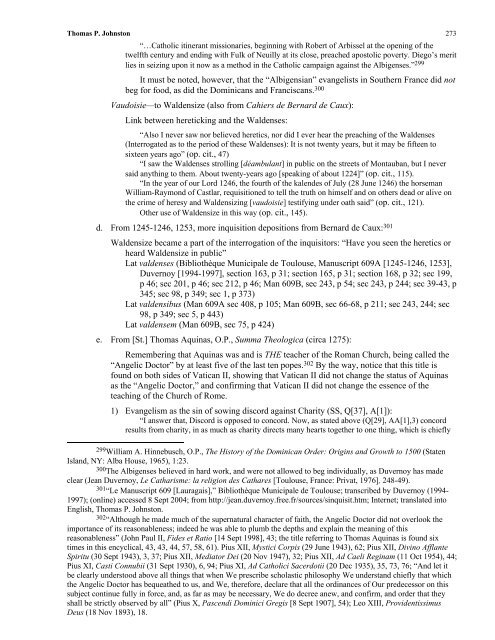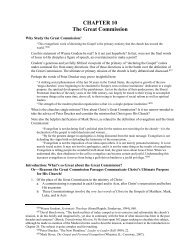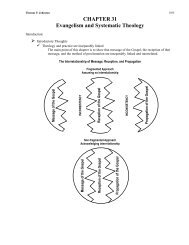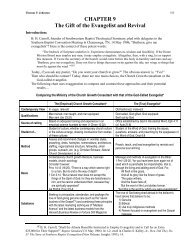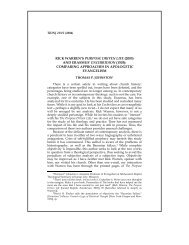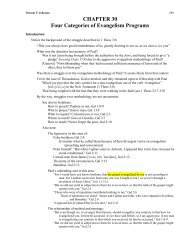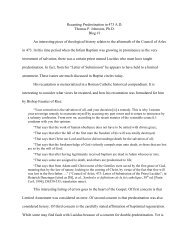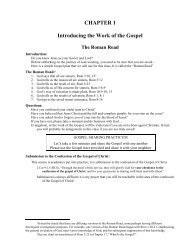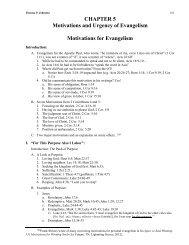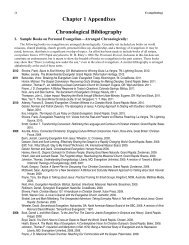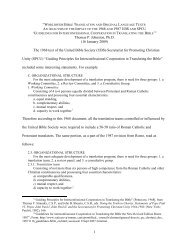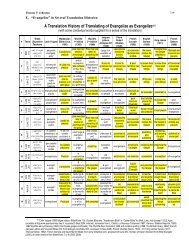CHAPTER 7 Defining Evangelizing - Evangelism Unlimited
CHAPTER 7 Defining Evangelizing - Evangelism Unlimited
CHAPTER 7 Defining Evangelizing - Evangelism Unlimited
You also want an ePaper? Increase the reach of your titles
YUMPU automatically turns print PDFs into web optimized ePapers that Google loves.
Thomas P. Johnston 273<br />
“…Catholic itinerant missionaries, beginning with Robert of Arbissel at the opening of the<br />
twelfth century and ending with Fulk of Neuilly at its close, preached apostolic poverty. Diego’s merit<br />
lies in seizing upon it now as a method in the Catholic campaign against the Albigenses.” 299<br />
It must be noted, however, that the “Albigensian” evangelists in Southern France did not<br />
beg for food, as did the Dominicans and Franciscans. 300<br />
Vaudoisie—to Waldensize (also from Cahiers de Bernard de Caux):<br />
Link between hereticking and the Waldenses:<br />
“Also I never saw nor believed heretics, nor did I ever hear the preaching of the Waldenses<br />
(Interrogated as to the period of these Waldenses): It is not twenty years, but it may be fifteen to<br />
sixteen years ago” (op. cit., 47)<br />
“I saw the Waldenses strolling [déambulant] in public on the streets of Montauban, but I never<br />
said anything to them. About twenty-years ago [speaking of about 1224]” (op. cit., 115).<br />
“In the year of our Lord 1246, the fourth of the kalendes of July (28 June 1246) the horseman<br />
William-Raymond of Castlar, requisitioned to tell the truth on himself and on others dead or alive on<br />
the crime of heresy and Waldensizing [vaudoisie] testifying under oath said” (op. cit., 121).<br />
Other use of Waldensize in this way (op. cit., 145).<br />
d. From 1245-1246, 1253, more inquisition depositions from Bernard de Caux: 301<br />
Waldensize became a part of the interrogation of the inquisitors: “Have you seen the heretics or<br />
heard Waldensize in public”<br />
Lat valdenses (Bibliothèque Municipale de Toulouse, Manuscript 609A [1245-1246, 1253],<br />
Duvernoy [1994-1997], section 163, p 31; section 165, p 31; section 168, p 32; sec 199,<br />
p 46; sec 201, p 46; sec 212, p 46; Man 609B, sec 243, p 54; sec 243, p 244; sec 39-43, p<br />
345; sec 98, p 349; sec 1, p 373)<br />
Lat valdensibus (Man 609A sec 408, p 105; Man 609B, sec 66-68, p 211; sec 243, 244; sec<br />
98, p 349; sec 5, p 443)<br />
Lat valdensem (Man 609B, sec 75, p 424)<br />
e. From [St.] Thomas Aquinas, O.P., Summa Theologica (circa 1275):<br />
Remembering that Aquinas was and is THE teacher of the Roman Church, being called the<br />
“Angelic Doctor” by at least five of the last ten popes. 302 By the way, notice that this title is<br />
found on both sides of Vatican II, showing that Vatican II did not change the status of Aquinas<br />
as the “Angelic Doctor,” and confirming that Vatican II did not change the essence of the<br />
teaching of the Church of Rome.<br />
1) <strong>Evangelism</strong> as the sin of sowing discord against Charity (SS, Q[37], A[1]):<br />
“I answer that, Discord is opposed to concord. Now, as stated above (Q[29], AA[1],3) concord<br />
results from charity, in as much as charity directs many hearts together to one thing, which is chiefly<br />
299 William A. Hinnebusch, O.P., The History of the Dominican Order: Origins and Growth to 1500 (Staten<br />
Island, NY: Alba House, 1965), 1:23.<br />
300 The Albigenses believed in hard work, and were not allowed to beg individually, as Duvernoy has made<br />
clear (Jean Duvernoy, Le Catharisme: la religion des Cathares [Toulouse, France: Privat, 1976], 248-49).<br />
301 “Le Manuscript 609 [Lauragais],” Bibliothèque Municipale de Toulouse; transcribed by Duvernoy (1994-<br />
1997); (online) accessed 8 Sept 2004; from http://jean.duvernoy.free.fr/sources/sinquisit.htm; Internet; translated into<br />
English, Thomas P. Johnston.<br />
302 “Although he made much of the supernatural character of faith, the Angelic Doctor did not overlook the<br />
importance of its reasonableness; indeed he was able to plumb the depths and explain the meaning of this<br />
reasonableness” (John Paul II, Fides et Ratio [14 Sept 1998], 43; the title referring to Thomas Aquinas is found six<br />
times in this encyclical, 43, 43, 44, 57, 58, 61). Pius XII, Mystici Corpis (29 June 1943), 62; Pius XII, Divino Afflante<br />
Spiritu (30 Sept 1943), 3, 37; Pius XII, Mediator Dei (20 Nov 1947), 32; Pius XII, Ad Caeli Reginam (11 Oct 1954), 44;<br />
Pius XI, Casti Connubii (31 Sept 1930), 6, 94; Pius XI, Ad Catholici Sacerdotii (20 Dec 1935), 35, 73, 76; “And let it<br />
be clearly understood above all things that when We prescribe scholastic philosophy We understand chiefly that which<br />
the Angelic Doctor has bequeathed to us, and We, therefore, declare that all the ordinances of Our predecessor on this<br />
subject continue fully in force, and, as far as may be necessary, We do decree anew, and confirm, and order that they<br />
shall be strictly observed by all” (Pius X, Pascendi Dominici Gregis [8 Sept 1907], 54); Leo XIII, Providentissimus<br />
Deus (18 Nov 1893), 18.


